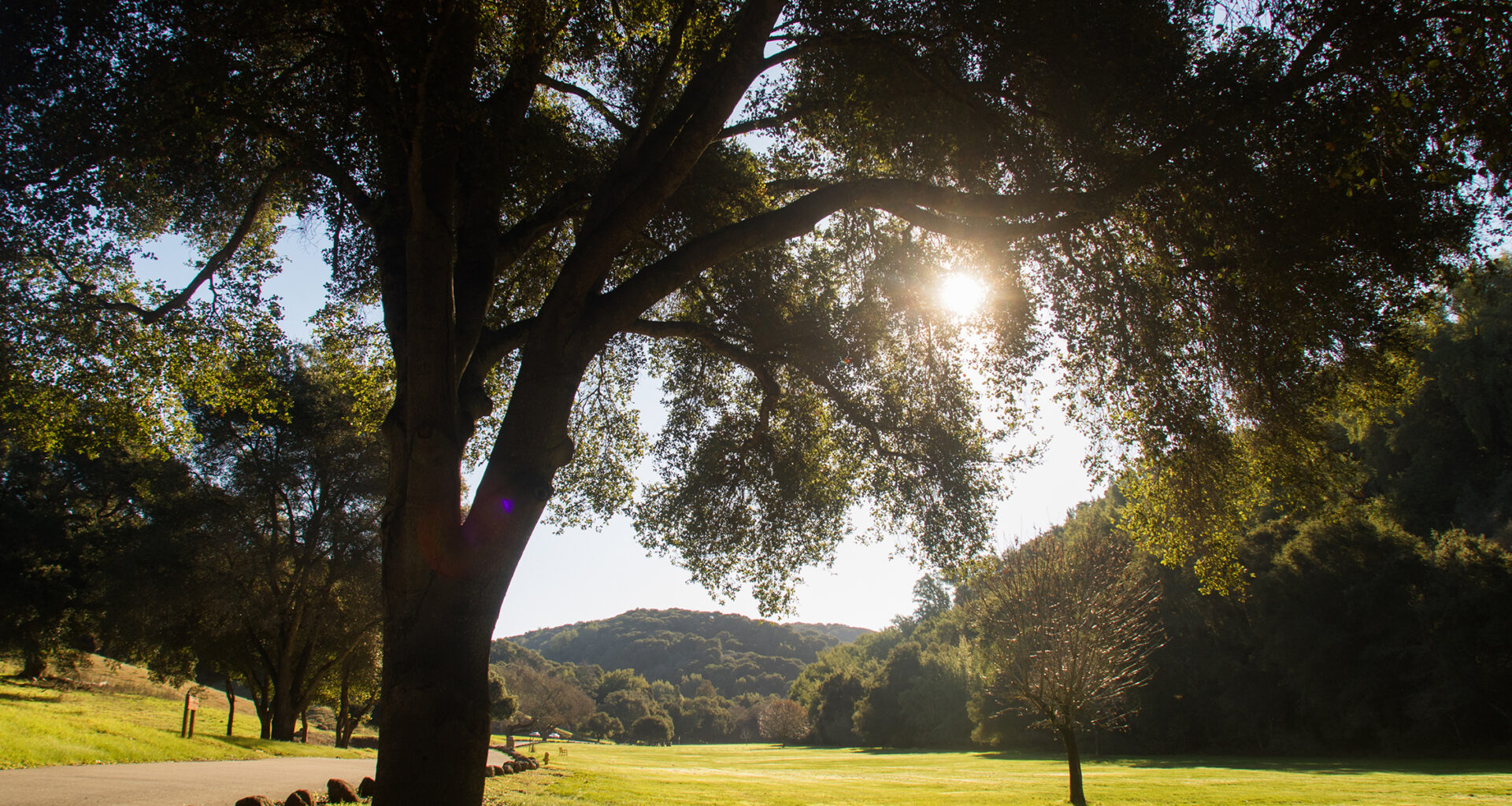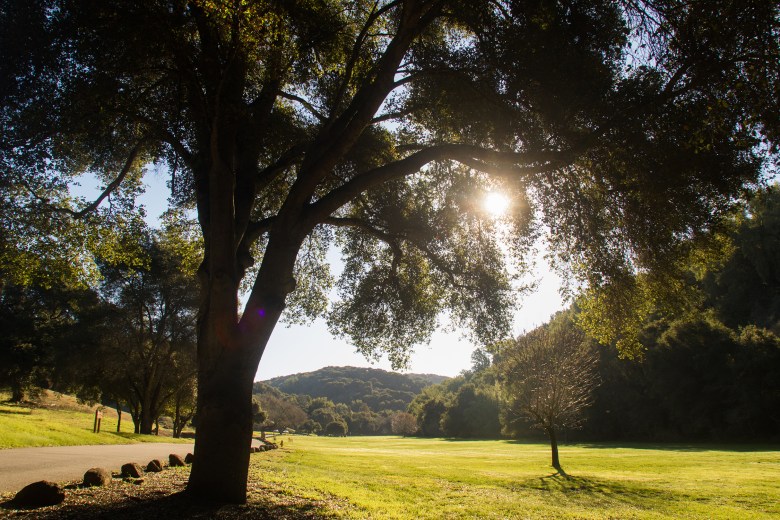 Foothills Nature Preserve in Palo Alto is one of many open space habitats in the Peninsula area that is the jurisdiction of the Loma Prita Chapter of the Sierra Club. File photo by Veronica Weber.
Foothills Nature Preserve in Palo Alto is one of many open space habitats in the Peninsula area that is the jurisdiction of the Loma Prita Chapter of the Sierra Club. File photo by Veronica Weber.
Longtime members of the Loma Prieta Chapter of the Sierra Club are raising alarms about what they call a hostile takeover of their organization by a pro-housing coalition.
The internal divide in the chapter — and the organization as a whole — stems from a tension between the Sierra Club’s historic environmental and conservation policies and a new wave of climate activists who are struggling to find the space to advocate for denser housing and public transportation.
The Loma Prieta Chapter of the Sierra Club, which will hold elections in November, spans three counties in the Peninsula and South Bay: San Mateo, San Benito and Santa Clara. It was founded in 1933, the fourth local chapter of the organization.
If the fake environmentalists succeed, the Sierra Club, like many of the true environmental groups in recent years, will lose its focus on conserving natural resources for future generations.
lydia kou, former palo alto mayor
In the Peninsula, one of the top advocacy priorities of the chapter is open space protection and preservation. In East Palo Alto last year, Sierra Club members successfully advocated to protect 17 acres of wetlands that were part of the city’s plan for shoreline development. Similarly, the group blocked a 2.5-mile offshore flood barrier wall proposed for Millbrae and Burlingame, arguing that it would endanger the water quality and shoreline ecosystems. Members are still pushing for local cities to adopt dark sky ordinances to reduce light pollution and bird-safe design standards for new construction.
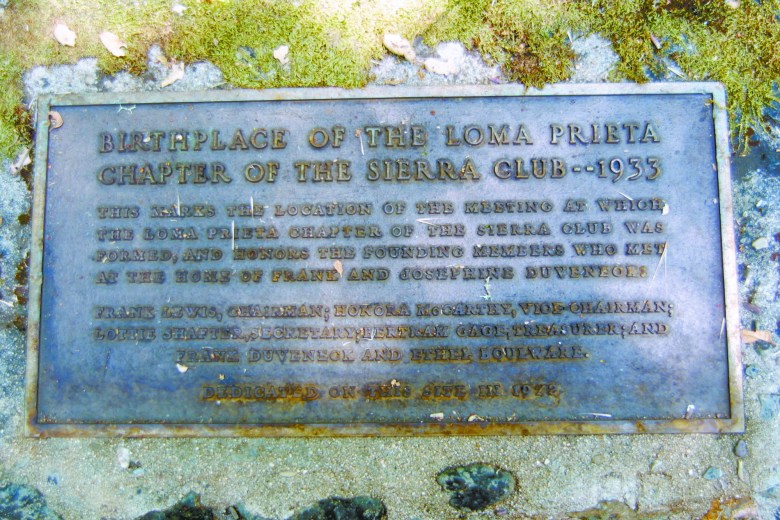 A rock a few miles up a trail from Hidden Villa’s visitor center commemorates the Sierra Club’s founding. Photo courtesy Pat Michels.
A rock a few miles up a trail from Hidden Villa’s visitor center commemorates the Sierra Club’s founding. Photo courtesy Pat Michels.
Splitting over priorities
While these environmental efforts are critical to the organization’s mission, many Sierra Club members see denser housing and public transportation as equally important — and they have been frustrated for years at the chapter’s lack of action in those areas.
“There’s a sort of symbiotic relationship between open space preservation and density, right? One of the key pieces of being an open space activist is supporting density in already developed areas,” said Leora Tanjuatco Ross, who has been a member of the Loma Prieta Chapter for 10 years.
Tanjuatco Ross is also the California director of YIMBY Action, a national nonprofit organization that advocates for more housing as part of the “Yes In My Back Yard” movement. YIMBY activism spun out of a frequent talking point among opponents of new development, which is that they support more housing, so long as it is somewhere else in the city — in other words, “not in my back yard.”
In records obtained by this publication, Tanjuatco Ross sent email blasts from the YIMBY Action account urging recipients to join the Sierra Club in order to become eligible to vote for leadership positions. The subject line of an Aug. 13 email reads: “Get in, we’re flipping the Sierra Club.”
“We can make a BIG difference in the Loma Prieta Chapter because leadership positions are decided by a handful of votes in their fall elections,” the Aug. 13 email continues. “This fall, I will send you a list of some amazing candidates who will turn the local chapter into a force for good.”
Those candidates for the chapter’s Executive Committee include transportation activist Mike Swire, battery materials engineer Mike Regula, Mountain View Council member Lucas Ramirez and Palo Alto Forward Vice Chair Natalie Geise. While they aren’t explicitly pro-housing in their candidate bios, an email from Ramirez obtained by this publication describes the coalition as dedicated to working on “the most impactful local climate policies — infill housing, transportation, and electrification.”
A pro-housing slate is also running for the Peninsula Regional Group Executive Committee — one of the chapter’s two regional groups. Those candidates include Yee Lee, Katie Behroozi, Dave Ashton and Mike Regula (who is running for both positions).
Tanjuatco Ross rejected the characterization that the group is committing a “hostile takeover,” as other Sierra Club members have described it, because the push for more pro-housing policies is coming from within the chapter.
“I’ve been a Sierra Club member for 10 years, so it’s my club too,” she said.
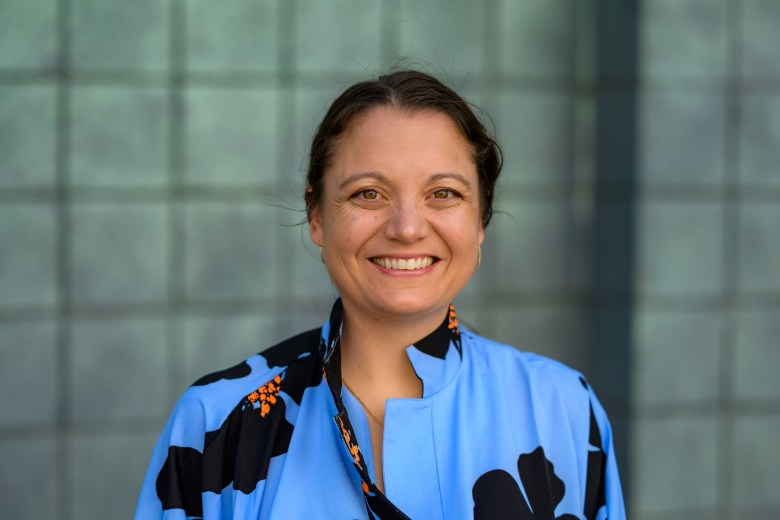 Leora Ross, California director of YIMBY Action, has been rallying support for pro-housing candidates for upcoming Sierra Club elections. Photo courtesy Leora Ross.
Leora Ross, California director of YIMBY Action, has been rallying support for pro-housing candidates for upcoming Sierra Club elections. Photo courtesy Leora Ross.
When asked why she was sending emails about the chapter elections from her YIMBY Action email to recruit new members, she declined to comment.
A bitter chapter
Her Aug. 13 email has already circulated among longtime Sierra Club members who see it as an effort to hijack the chapter’s election process.
“Because of the low turnout in Loma Prieta elections, the election of new candidates will be decided by only a few people. They said as much in their email,” Anita Stewart, a longtime Sierra Club member, said in an email to this publication. “This outside organization (YIMBY Action) is attempting to hijack the Loma Prieta Chapter and counterfeit the chapter’s endorsement to support housing development and reduce protections of our local natural resources.”
Stewart said she respects the pro-housing coalition’s goals and agrees with many of them, but feels that the Sierra Club is the wrong venue to advocate for them.
Former Palo Alto Mayor Lydia Kou sent an email blast of her own to Sierra Club members on Sept. 10, alerting them to what she called an “ugly hostile takeover by YIMBY Action and their allies.”
Like many longtime Sierra Club members, Kou does not wish to conflate dense housing policies with the chapter’s existing goals around conservation. Instead, she described the two initiatives as incompatible under the Sierra Club tent, and wrote that the policies of the pro-housing groups actually represent a threat to the chapter’s priorities governing open space and water quality.
“If the fake environmentalists succeed, the Sierra Club, like many of the true environmental groups in recent years, will lose its focus on conserving natural resources for future generations,” Kou wrote.
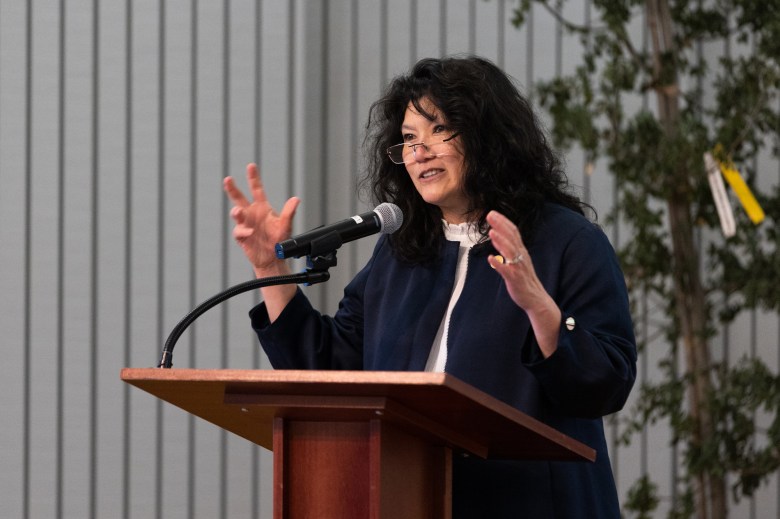 Former Palo Alto Mayor Lydia Kou speaks at the State of the City event at the Palo Alto Art Center on March 22, 2023. Photo by Magali Gauthier.
Former Palo Alto Mayor Lydia Kou speaks at the State of the City event at the Palo Alto Art Center on March 22, 2023. Photo by Magali Gauthier.
She also urged recipients of the email to vote in the upcoming elections for other candidates, most of whom are seeking re-election on the chapter or regional group Executive Committees. Kou did not respond to multiple requests for comment.
Housing Action Coalition, a San Francisco-based nonprofit that operates statewide and advocates for more housing to address affordability and displacement, is another organization that has sent email blasts urging members to “flip” the Sierra Club, with the same list of candidates to support as YIMBY Action.
Ali Sapirman, advocacy and police manager at Housing Action Coalition, sent an email out on Aug. 4 urging recipients to join and vote because “the chapter’s policy stances and endorsements do not address the most impactful local actions we have with respect to climate (infill housing and more transportation options).”
Sapirman declined to comment when reached by email.
Not just housing
Despite the urging from YIMBY Action and Housing Action Coalition, Loma Prieta Chapter Chair Mike Ferreira said the number of new members in August has been on track with previous years.
“The numbers were only slightly above average,” he said. “Normally, were it not for this thing that’s going on, we might not even have noticed it.”
Not all the candidates pushed by the two groups are explicitly YIMBY, or even explicitly pro-housing. It appears that other Sierra Club members are more concerned about the coalition’s association with YIMBY groups — even though the candidates themselves state that their advocacy is primarily about environmental issues, with housing being one of many pieces that make up that advocacy.
Regula said his primary focus is on energy storage and battery technology. Regula has been a member of the Loma Prieta Chapter for about six months, he said, but he hopes to bring his decade of experience in battery materials engineering to the Sierra Club and advocate for renewable energy and more environmentally friendly transportation.
Another main component of his campaign is fostering community within the chapter. One of the challenges Regula sees in the chapter right now is declining membership, for example.
Behroozi, a Menlo Park resident who is running for the regional Executive Committee, said she was motivated to run because it feels more productive to take local action instead of “wringing my hands about the state of the world.” Her climate advocacy in the past has focused on making transportation more accessible while reducing car dependency.
In terms of housing, she said her values align with the existing Sierra Club policies that support infill and transit-oriented development.
“I’d like to see our chapter continue to advocate for these policies and endorse candidates who support them,” she wrote in an email.
Other candidates see housing as a bigger part of their campaign for the Executive Committee.
Ramirez, the Mountain View Council member, said the Sierra Club has gone on record opposing housing that he says is exactly the kind that environmentalists should support.
“High density housing with dedicated land for park space (and) walking distance from the downtown Caltrain station strikes me as the type of housing that we want to see in our communities,” he told this publication.
Ramirez said he was opposed to building more housing in areas that would contribute to urban sprawl and damage sensitive lands and wildlife habitats, referring specifically to builder’s remedy projects that have been proposed for unincorporated parts of Santa Clara County. Those projects will have severe and negative lasting impacts on the environment, Ramirez said.
Ramirez also noted that there are different perspectives within the Sierra Club, which he has been a member of since 2014. But the tent was big enough for all kinds of advocacy work.
“The intent is not to stifle voices,” Ramirez said.
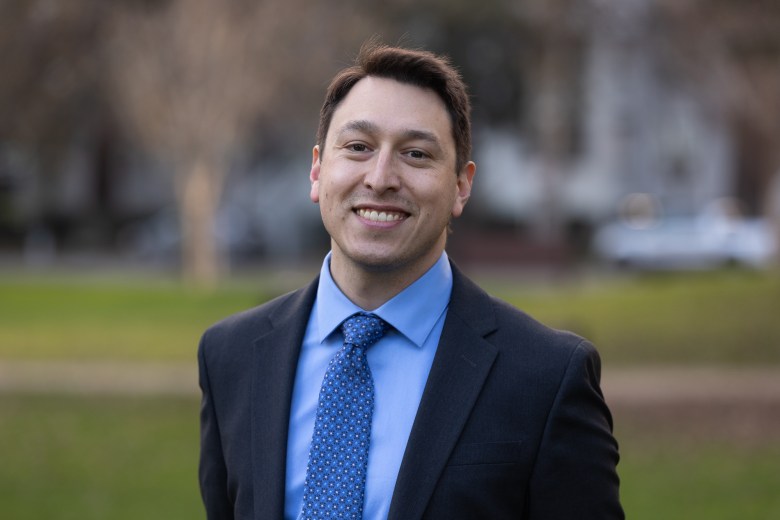 Lucas Ramirez, former mayor of Mountain View, in Eagle Park in Mountain View on Jan. 17, 2022. Photo by Magali Gauthier.
Lucas Ramirez, former mayor of Mountain View, in Eagle Park in Mountain View on Jan. 17, 2022. Photo by Magali Gauthier.
Like Tanjuatco Ross, he said the idea that pro-housing candidates represented a “hostile takeover” of the Sierra Club also was hyperbole and an inaccurate representation of what actually was possible. He noted that he did not have a position of power in the Sierra Club and doesn’t have control over the election procedures.
With his candidacy, Ramirez says the hope is to include more support for environmentally sustainable policies, like infill housing development in transit-rich areas. Support for those kinds of projects would go hand-in-hand with the Sierra Club’s longstanding work of protecting and preserving agricultural and environmentally sensitive lands, open space areas and wildlife, Ramirez said.
Thinking locally
Nationally, the Sierra Club supports denser housing, more public transportation and other policies that create sizable overlap with the agenda of many YIMBY organizations. In August 2021, the national Sierra Club issued a report over 100 pages long supporting urban infill housing and recommending strategies for local chapters to implement policies toward that end.
High density housing with dedicated land for park space (and) walking distance from the downtown Caltrain station strikes me as the type of housing that we want to see in our communities,
lucas ramirez, mountain view city council member, candidate for executive committee
The report lists a primary misconception about infill housing advocacy as being that “Sierra Club’s overriding objective, in the urban/suburban context is the preservation of trees.” The report also describes the NIMBY opposition to new housing — that it would be appropriate somewhere else in the city or neighborhood — as “an enormous problem.”
Local chapters must abide by the national policies, but they often diverge when it comes to strategies and endorsements.
While the Loma Prieta Chapter has not made statements or endorsements of statewide housing policy recently, the statewide group often opposes changes to the California Environmental Quality Act that are intended to make housing easier and cheaper to build. CEQA requires lengthy environmental reports and public engagement for new development, and state lawmakers have authored dozens of legislation in recent years to streamline the process or exempt certain types of development from CEQA review.
The state and local chapters argue instead that CEQA remains an important safeguard against environmental destruction from new developments.
“These half-baked bills written behind closed doors will have destructive consequences for environmental justice communities and endangered species across California,” Sierra Club California wrote in a statement after the passage of Assembly Bill 130 and Senate Bill 131 earlier this year. Both bills either streamline or exempt some developments and rezoning under CEQA.
The elections for the Loma Prieta Chapter take place in November, but like the YIMBY Action email alluded to, turnout is historically low. Stewart, one of the longtime Sierra Club members, said people receive a ballot with background information on candidates, but it often ends up unread, discarded, or both.
Candidates for chapter leadership positions are selected by the chapter’s appointed Nominating Committee, which is instructed to put at least two more candidates on the ballot than there are open positions, according to the chapter bylaws. Candidates can also get a spot on the ballot via a petition signed by at least 40 chapter members. For regional leadership, the petition only needs 15 signatures.
Ferreira, the chapter’s chair, said this is the first time in the chapter’s history that Executive Committee candidates are on the ballot through petitioning, which presents a new challenge for running this year’s elections.
As the internal divide reaches a tipping point in the organization’s future of advocacy, he said the election could also provide an opportunity for greater engagement going forward.
“If you don’t have a burning issue, people are going to tend to think, ‘Why should I vote?’” he said. “So I would expect turnout to double or more.”
Staff Writer Emily Margaretten contributed to this report.
Most Popular

